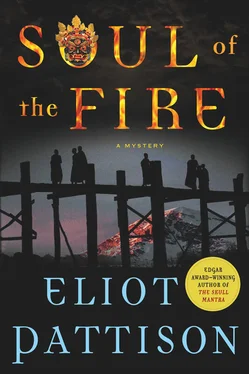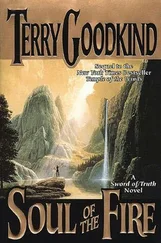Eliot Pattison - Soul of the Fire
Здесь есть возможность читать онлайн «Eliot Pattison - Soul of the Fire» весь текст электронной книги совершенно бесплатно (целиком полную версию без сокращений). В некоторых случаях можно слушать аудио, скачать через торрент в формате fb2 и присутствует краткое содержание. Год выпуска: 0101, ISBN: 0101, Издательство: St. Martin, Жанр: Полицейский детектив, на английском языке. Описание произведения, (предисловие) а так же отзывы посетителей доступны на портале библиотеки ЛибКат.
- Название:Soul of the Fire
- Автор:
- Издательство:St. Martin
- Жанр:
- Год:0101
- ISBN:9781250036476
- Рейтинг книги:4 / 5. Голосов: 1
-
Избранное:Добавить в избранное
- Отзывы:
-
Ваша оценка:
- 80
- 1
- 2
- 3
- 4
- 5
Soul of the Fire: краткое содержание, описание и аннотация
Предлагаем к чтению аннотацию, описание, краткое содержание или предисловие (зависит от того, что написал сам автор книги «Soul of the Fire»). Если вы не нашли необходимую информацию о книге — напишите в комментариях, мы постараемся отыскать её.
Soul of the Fire — читать онлайн бесплатно полную книгу (весь текст) целиком
Ниже представлен текст книги, разбитый по страницам. Система сохранения места последней прочитанной страницы, позволяет с удобством читать онлайн бесплатно книгу «Soul of the Fire», без необходимости каждый раз заново искать на чём Вы остановились. Поставьте закладку, и сможете в любой момент перейти на страницу, на которой закончили чтение.
Интервал:
Закладка:
Dolma sighed but did not look up. Tserung tightly gripped his gau. Lokesh grinned.
“I can speak English,” Shan announced.
“Lha gyal lo,” Lokesh replied, then stood and urged Dolma and Tserung to their feet.
Moments later, they waited by the goat shed as Tserung opened the padlock on its door. Shan stepped to the nearby tarchen and grabbed the fluttering flag. The wire was tiny, barely visible in the moonlight. It had been expertly sewn into the hem of the flag, then twisted into the cord that secured it to the pole before joining with the strand of smaller prayer flags that ran to the goat shed.
In the light of a kerosene lantern held by Tserung, Shan could see where the wire entered through the wall and disappeared behind a wooden crate covered with a fleece. Dolma uncovered the crate and lifted it to reveal a large radio receiver. Lokesh gave a boyish laugh. Tserung switched on the device and it hummed to life.
“And now for our personal message board,” came the British-sounding voice from Dharamsala.
Shan did not know what they sought, and would not ask. He translated everything. Name day greetings, news of births, tidings of death, names of monks in India who had passed their advanced exams to join the ranks of geshe. He did not know when they started smiling, but at some point, he realized Dolma and Tserung had joy on their faces. As he helped Dolma conceal the radio again, he recalled how they had described the loss of their son. “Your son did not come back from a pilgrimage,” he recalled. “It was a pilgrimage to India.”
Dolma smiled. “Perhaps the greatest pilgrimage of all is to go meet with the Dalai Lama. Our son is in Dharamsala, yes. He works for all Tibetans now.”
Afterwards, Lokesh walked with him to the edge of the village. “I saw a meteor shower last night. A sign of momentous events.”
“The most momentous will be when you and I return to the hills of Lhadrung,” Shan said.
“You understand that above all, Dawa must be saved,” Lokesh replied. “I told you my dream of her. She is a bodhisattva , Shan. She may not understand, but I am convinced of it.”
Shan paused and looked at his friend. Never before had he had heard Lokesh speak of another person this way. A bodhisattva was an enlightened being who chose to stay among humans to help them rather than moving on to a higher plane of existence.
“She is flesh and blood,” Shan ventured awkwardly, not wanting to argue. “She brings hope to thousands.”
“She must be saved,” Lokesh said again. “Do not interfere with their plans. Do not let the sacrifices be in vain.”
“She must be saved,” Shan echoed, not understanding, and struggling not to read foreboding into the old man’s words. They walked on. Shan spoke about the dog. Lokesh said he had been praying for Shan’s son, Ko. They stopped when they reached the wind fangs.
“I was scared when those knobs arrested us that day in the ditches,” Lokesh confessed. “But now I see it was my destiny. You can go for years looking for meaning-then it just falls on you like a nut from a tree.” He made a gesture toward the shimmering stars. “They look different now, like they are waiting,” he said, then turned and embraced Shan. “You have always understood, my friend. You have always understood the importance of realizing our destinies.” He handed Shan an envelope, then turned back to the village.
Shan watched Lokesh with a confused smile on his face. He was not sure he could make sense of their conversation, but it was not the first time that had happened, and it was blessing enough just to be with the old man. He leaned into the wind and traversed the fangs.
Back in his room, he discovered that someone had arranged for his bed to be removed. No new bed replaced it, but there was a pile of blankets by the door. Shan arranged them on the floor and set his little Buddha on the footstool, lit a cone of incense beside it, and tried to pray. After several minutes, he rose and found a box of sugar in the little kitchen cabinet. He poured the sugar onto the counter, spread it out, and drew another tetragram, a repeating pattern of a solid line over a line broken into two segments. It signified Verse Eleven of the Tao Te Ching. He whispered the words to himself:
Clay is shaped to form a vessel
What is not there makes the vessel useful.
Doors and windows are cut to form a room.
What is not there makes the room useful.
Take advantage of what is there by making use of what is not.
The one certainty he had was that he was missing something, the piece of the puzzle that bound all the others together. He had thought Xie’s murder was the beginning, then the murder of the woman in Macau. But his instinct now told him he was wrong. It had started when the Americans met Dawa in Colorado.
He settled back before the little Buddha and stared at it. He had learned in Tibet not to trust the investigator inside him. Facts were too often misleading. The truth lay elsewhere, in the clouded countenance of Tuan, the sidelong glances between Dawa and Judson, in Pao’s lust for manipulation and the staging of a purification ritual for Hannah Oglesby.
He had no idea of the time when he finally stood, but was yawning and folding a blanket for a pillow when he remembered the envelope, which he had dropped on the table. On long winter nights, he had taught Lokesh the verses of the Tao Te Ching, and his old friend had written the tetragram for his own favorite verse, Number Twenty-nine. The world is a mysterious instrument, it said, not made to be handled. Those who act on it spoil it. Those who seize it, lose it.
With a yawn, he opened the envelope, smiling to find a handwritten note from Lokesh. Attaining final fulfillment, the words said, is not a mere blowing out of the candle. / It is the last flame that marks the arrival of dawn. He hesitated a moment, recognizing the parchment from Shetok, then felt something else in the envelope and upended it on his palm.
The world went dark. A terrible racking sob shook Shan. He stopped breathing. In his palm was one of the severed halves of Lokesh’s identity card. The words were a death poem. The old Tibetan was going to immolate himself.
CHAPTER SEVENTEEN
He waited for the Americans to emerge from town on their dawn hike and followed. Their pace was slow, as if Hannah, wearing a hood against the chill air, had not yet recovered from her altitude sickness. At times, she stopped and leaned on Judson. Shan stayed in the shadows, pausing at large outcroppings as the Americans kept moving. Birds flew low in the heather. They did not raise their binoculars. When they finally entered the little herder’s hut a mile from Zhongje, he was close behind.
They were kneeling at a little makeshift altar when he entered. “You have to stop whatever it is you are doing,” he said to their backs. “It’s not worth his life!” He felt strangely out of breath. All the emotion that had dammed up inside since seeing the severed card finally broke through. “He is the only person who can make me laugh! He makes me want to live! He makes Tibetans want to live!”
Judson fixed him with wide, worried eyes. Shan hated the frightened, desperate person he had become. “Lokesh is like the last of an ancient species nearing extinction,” Shan said in a steadier voice. “Don’t let him end it like this.”
“Shan, please,” Judson said. “You’re scaring me. I don’t know what you are talking about.”
“What he is talking about,” said the woman beside him, “is this.” She turned. It wasn’t Hannah beside Judson. Dawa held up the other half of Lokesh’s identity card.
Читать дальшеИнтервал:
Закладка:
Похожие книги на «Soul of the Fire»
Представляем Вашему вниманию похожие книги на «Soul of the Fire» списком для выбора. Мы отобрали схожую по названию и смыслу литературу в надежде предоставить читателям больше вариантов отыскать новые, интересные, ещё непрочитанные произведения.
Обсуждение, отзывы о книге «Soul of the Fire» и просто собственные мнения читателей. Оставьте ваши комментарии, напишите, что Вы думаете о произведении, его смысле или главных героях. Укажите что конкретно понравилось, а что нет, и почему Вы так считаете.












